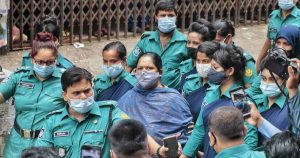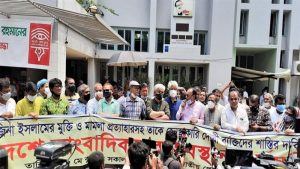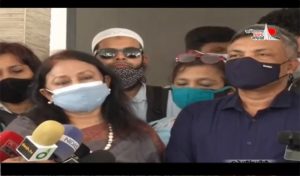Mostafa Kamal Majumder
If anybody asks me if I have come to the profession of journalism by conscious choice, my answer will be both ‘yes’ and ‘no’. Yes, because after coming to this profession I have really made no serious effort to change to another. No, because had I not come to journalism during my student life it would have been difficult to say where I would have ended up. May be in teaching, maybe in civil service. I joined a newspaper during my university days as I had to look for some avenues to earn money to support my studies. This was because by the end of 1973 when I was preparing to appear at the honours final examination in political science, my father was no longer able to send me money from his meagre earning from the agriculture-based family. Plus there were repeated crop losses. My father had a difficult time also because the joint family he headed broke up and my uncles got themselves separated taking with them their shares of land resources. He was heavily indebted as he did bear the educational expenses of five out of ten of us – two brothers and three sisters at that time. Five others were younger.
I recall I went home to celebrate the Eid-ul-Azha festival with our family at our Gulbahar village home in Kachua, Chandpur two months before the examination. After the Eid my parents were unable to collect money to send me back to continue my studies at the Surja Sen Hall. My father tried his best and managed to persuade three persons one after another to lend him money. But they changed their minds in no time. One village politician had also become active to foil my father’s efforts to collect money. The first one told my father he would have to repay a bank loan and cannot dispense with his cash money. This was a reminder from the village politician. The second one said he can give money only if a plot of agricultural land with paddy crop at the flowering stage was mortgaged to him. The third man, very close to our family, who initially said he needed no profit and would be happy to get the money back during the season of renting agricultural land two months later. But ultimately he also changed his mind and said with the amount of money he promised to give he can mortgage a plot of land. Nearly one month elapsed. In the meantime my mother wrote to her brother, owner of a prominent book shop at Jessore town, informing him of the situation. The maternal uncle was kind enough and in reply asked my mother to immediately send me to Dhaka assuring support by sending money in monthly instalments. I set off for Dhaka.
After the examination, I looked for an avenue of income to support myself and my destiny drove me to a newspaper office. There was famine in the country at that time. I along with an employee of the Morning News (now defunct) went to The Bangladesh Times office on November 14, 1974 and met the News Editor of the paper who was known to my companion. The News Editor sought to know if I can write correct English. Then he also wanted to be sure if I know of problems facing students of my university. He asked me to write a small piece of news on one of those the next day. I complied. The news item was published the next day with a slight addition to its headline. ‘Dhaka University Library remains dark [at night]’. The news editor said, continue to submit stories. At the end of the month, he asked me to collect my letter of appointment and salary for 16 days. The thrill of my writings coming out in print that too on the pages of a newspaper was beyond description. More importantly, I found financial support which together with my maternal uncle’s monthly money order was somewhat adequate to meet my dormitory costs and educational expenses.
In those days there were more English newspapers readers than they are today. And feedback to writings came regularly. I recall, one day I was interviewing education secretary Mujibul Huq, a very senior bureaucrat of Bangladesh from then prestigious CSP cadre at the secretariat office. Out and out a professional man Mujubul Huq introduced me to Prof. Aminul Islam, Vice-Chancellor of Bangladesh Agricultural University Mymensingh, who was sitting before him and offered me a stick of cigarette from his 555 pack. I was a smoker but politely declined. At the close of the interview he reached me up to the exit door of his room. As I came out I found a young smart man enthusiastically wanting to talk to me. He said he knew me from the time of my visit to the Shaheed Titumir College, where he was a teacher, several days ago. With great contentment he informed me a group of students of the college who were arrested by police were released on the day my report on the incident was published in The Bangladesh Times. I felt exalted. More than a dozen students of the college had been arrested. It should be in the year 1996. The students had a minor clash with some drivers and helpers of the Gulshan- Motijheel bus service who complained to the police leading to the arrests. I was assigned to investigate the matter. My investigation revealed that the minor clash was the outcome of a longstanding dispute between the students of the college and drivers and helpers of the Gulshan-Motijheel service buses. The students always requested the helpers to drop them at the college gate. But the drivers and helpers most often carried them up to the Mohakhali Wireless Gate, the bus stop, thus making the students walk back to their college. On the day of the minor clash, the students got very angry and altercated with the drivers and helpers of a bus. And the minor clash ensued. The bus transport workers were members of the Sramik league and were very influential. They managed to get the students involved arrested. On the day the report was published and the students were released they issued a strongly worded statement venting their anger against the ‘anti-worker and reactionary report’.




